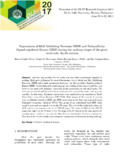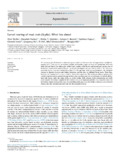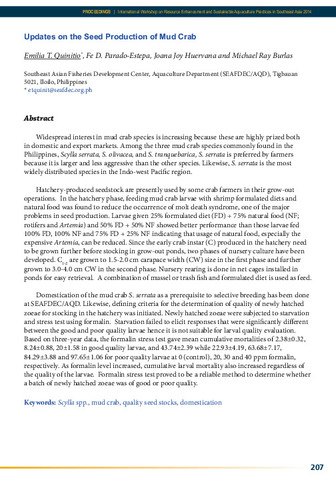Expressions of molt-inhibiting hormone (MIH) and extracellular signal-regulated kinase (ERK) during the molting stages of the giant mud crab, Scylla serrata
Share
Abstract
Survival and growth of mud crabs and any other crustaceans depend on molting. Molting is influenced by several hormones, two of which are Molt-Inhibiting Hormone {MIH} and a molt promoting hormone, the Extracellular Signal-regulated Kinase (ERK). Controlling and synchronizing the molting of the crabs would be a big boost to the mud crab industry, especially in the production of soft shell crabs. The best way to control molting would be to stock juvenile crabs of the same molting stage together. In this study, hormone expressions were analyzed using quantitative Real-Time Polymerase Chain Reaction (1RT-PCR). Molt stages of 36 juvenile S. serrata were established based on MIH and ERK expression levels that was analyzed using Principal Component Analysis (PCA). One group of six individuals had MIH value equal to zero and presumed to be in the PR stage. The rest of the crabs had values for MIH and were presumed to be in the PM-IM stage. The value of ERK for the PM-IM stage was higher at 24.79 than in the PR stage at 21.67. Based on the data gathered, morphological markers may now be identified to standardize hormone expression. This would be the first study concerning the comparison of hormones during molting.
Suggested Citation
Perez, K. C., Huervana, J. J., Eguia, M. R., & Ablan-Lagman, M. C. (2017). Expressions of molt-inhibiting hormone (MIH) and extracellular signal-regulated kinase (ERK) during the molting stages of the giant mud crab, Scylla serrata. In Proceedings of the DLSU Research Congress 2017, De La Salle University, Manila, Philippines, June 20-22, 2017. Manila, Philippines: De La Salle University.
Subject
Taxonomic term
Collections
Related items
Showing items related by title, author, creator and subject.
-
Larval rearing of mud crab (Scylla): What lies ahead
Waiho, Khor; Fazhan, Hanafiah; Quinitio, Emilia T.; Baylon, Juliana C.; Fujaya, Yushinta; Azmie, Ghazali; Wu, Qingyang; Shi, Xi; Ikhwanuddin, Mhd; Ma, Hongyu (Elsevier, 2018)The increasing global demand for mud crabs (genus Scylla) and threats to the wild populations highlight the urgency of fully rearing them in captivity. Despite considerable progress in mud crab production, most crab farms ... -
Mud crab pond and pen culture
Rodriguez, Eduard M. (University of the Philippines Aquaculture Society, Inc, 2001) -
Updates on the seed production of mud crab
Quinitio, Emilia T.; Parado-Estepa, Fe D.; Huervana, Joana Joy; Burlas, Michael Ray (Aquaculture Department, Southeast Asian Fisheries Development Center, 2015)Widespread interest in mud crab species is increasing because these are highly prized both in domestic and export markets. Among the three mud crab species commonly found in the Philippines, Scylla serrata, S. olivacea, ...






